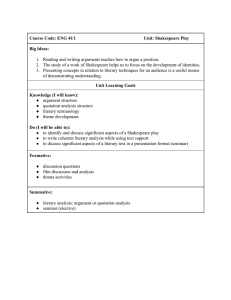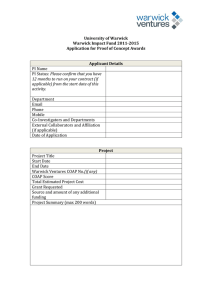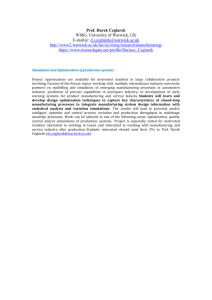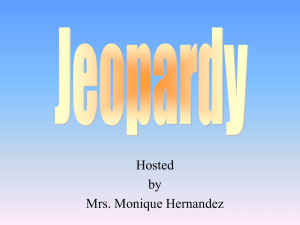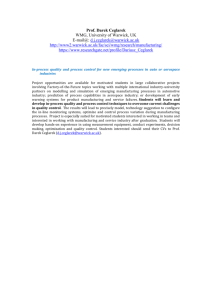Humanities Research Centre Annual Report 2014-15
advertisement
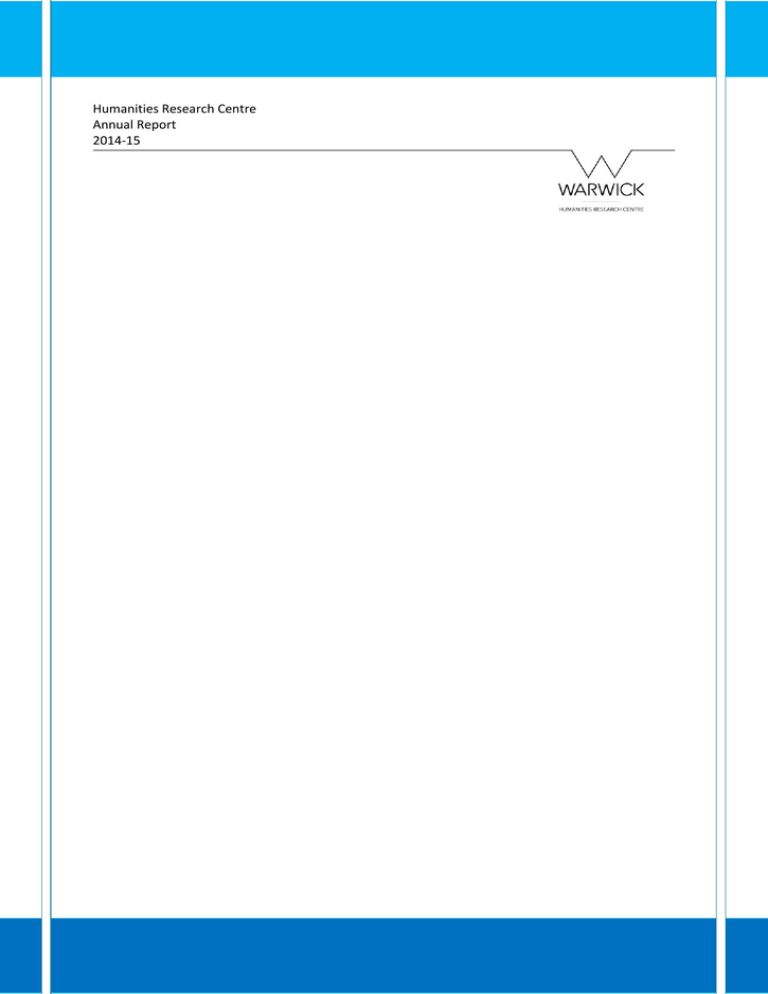
Humanities Research Centre Annual Report 2014-15 In the course of the academic year, the Centre organised and supported a variety of conferences, lectures, seminars, and other events: Iran and the West: Converging Perspectives Minorities in Armies: Ethnicity, Race, Alienage Addiction and Culture since 1800 University Oral Histories: Creating and Interpreting Narratives of Higher Education The Configuration of the Spanish Public Sphere: 18th-21st Centuries Hearing the Voice, Hearing the Soul Imaging War - Imagining the Nation Ruling Climate: The theory and practice of environmental governmentality 1500 - 1800 Warwickshire Parishes: History and Legacy For a Materialist Psychoanalysis Networks of Media and Print in the Age of Imperialism Reassessing Courtliness in Medieval Literature Adaptation and the Stage in the Nineteenth Century Narcissism and Melancholia: Reflections on a Century (Re)Imagining the Insect: Natures and Cultures of Invertebrates, 1700-1900 Making and Mobilising Objects: People, Process and Place Voice and Silence: (Beyond) the Rhetoric of Pain Shame and the Act of Writing SF/F Now 'Cross-over Artists': the international careers of early C20 theatre artists between stage, microphone and camera Travelling between the Centre and Periphery: Creating a Feminist Dialogue for the Diaspora Currencies between Cultures Arts Faculty Postgraduate Seminar Series Once again the HRC was able to sponsor the Arts Faculty Seminar Series enabling postgraduate students from the Faculty to meet regularly for research seminars. The aim of the series is to broaden awareness of the doctoral work taking place within the faculty whilst creating a relaxed forum for young researchers to practice presenting their work. The seminars provide an opportunity for all students to offer valuable feedback on this work, strengthening their critical tools and expanding their inter-disciplinary experiences, and fostering a great sense of community. Seminar panels 2014-2015: Representing Non-Western Worlds Jenny Mak (English and Comparative Literary Studies): The Kin-Erotic Tongue in Jamaica Kincaid’s Lucy Charles Marshall (French Studies): Encountering the Orient through the Lens of Europe: Contrasting Early Modern French Travel Narratives Chair: Dr Chris Campbell, Yesu Persaud Centre for Caribbean Studies Constructing Postcolonial Identities Madeleine Scherer (English and Comparative Literary Studies): Eavan Boland’s Reception of Greek Mythology Polly Gallis (French Studies): Nancy Huston: renegotiating the space between the global and individual subjectivities. Chair: Waiyee Loh, English and Comparative Literary Studies Perspectives on Comack McCarthy James Christie (English and Comparative Literary Studies): ‘Days of Begging, Days of Theft': The Philosophy of Work in Blood Meridian Ronan Hatfull (English and Comparative Literary Studies): ‘A Man May See How This World Goes With No Eyes’: Blindness and Bloody Triumvirates in Outer Dark, Macbeth and King Lear Chair: Dr Nick Monk, English and Comparative Literary Studies Gender Relations in Literature Maria Cohut (English and Comparative Literary Studies): The Spectral Woman vs the Usurping Portrait in the Poetry of Dante Gabriel and Christina Rossetti Iman Sheeha (English and Comparative Literary Studies): “I think ’tis I am tainted”: Loss and Restoration of Male Honour in Thomas Heywood’s A Woman Killed with Kindness (1603) Chair: Dr Joanna Rzepa, English and Comparative Literary Studies Economic and Social Histories Nathan Murphy (Classics and Ancient History): A denarius perpetuus? The circulation of the “legionary denarii” of Mark Antony in Roman Italy and Britain 32 BC to AD 294 Michael Tsang (English and Comparative Literary Studies): Xu Xi’s History’s Fiction: History of Place vs History of People Chair: Dr John Gilmore, English and Comparative Literary Studies Early Twentieth-Century Japanese Political Philosophy and its Legacy Atsuko Naito-Watanabe (Politics): Going Back to Nature? Nishida Kitaro’s Theory of Place, Japan’s Cosmopolitanism, and Manga Waiyee Loh (English and Comparative Literary Studies): Empire of Cool: Imperialism, Commodities, and Cultural Capital in Neo-Victorian Shojo Manga Chair: Dr Felix Rösch, Coventry University Travel in Past and Present Elsa T. Oommen (Sociology): ‘Mobile Youth’ and Binaries of Work and Leisure Chiaki Ohashi (English and Comparative Literary Studies): ‘Sensational Alliance’: The Risorgimento, Feudalism, and the Aristocratic Identity of Count Fosco in The Woman in White Chair: Dr Tara Puri, Institute of Advanced Studies, Travel and Mobility Studies Network Eighteenth Century Seminar Programme of Events Silvia Sebastiani (EHESS, Paris): 'Orangutans and Black Slaves in Global Perspective: Challenging the Boundaries of Humankind at the End of the 18th Century' William Doyle (University of Bristol): ‘Thinking about the Ancien Regime’Melodee Beals (Sheffield Hallam): ‘Mennon and McGillivray: Scotland and the North American Frontier (1790-181’ David Bell (Princeton University): ‘Mr. Boswell Goes to Corsica: Charismatic Authority in the Age of Revolutions’ John Morgan and Sara Miglietti (Warwick): ‘Flooding and Politics in Early Modern England’ and ‘Changing Place, Changing Man: Climate Theory and 'Human Engineering' in the Early Modern Period’ Giorgio Riello (Warwick): ‘With Great Pomp and Magnificence: Royal Gifts and the Embassies between Siam and France in the 1680s’Antoine Lilti (École des Hautes Études en Sciences Sociales): ‘The Origins of 'Célébrité' (1750-1850)’ Charlotte Roberts (UCL): ‘Sympathy at the End of History: Edward Gibbon and his Romantic Legacy’ Elodie Duché (Warwick): ‘Brahmins, Brothers or Lovers? British prisoners of war and their contacts with Napoleonic France’ Margot Finn (UCL): ‘Harem Histories & Princely Politics: Tipu Sultan (the Family & East India Company Rule’Tita Chico (University of Maryland): ‘Experimentalism: Literary Knowledge and Science in Eighteenth-Century Britain’ Michael Bycroft (Warwick): ‘Alchemy, Art and Electricity: Gems at the Académie Royale des Sciences c.1700-1750’ Jim Livesey (University of Dundee): ‘The Global History of la France profonde: Languedoc in the Eighteenth Century’ Sidelights on Shakespeare – Seminar Series In August 2014 Dr Paul Prescott undertook an epic road trip across North America. Over 63 days he travelled 10,000 miles, witnessed 14 theatre festivals and saw 40 productions of Shakespeare’s plays. In November, Paul shared his experiences with us, and asked what they had revealed about America’s ‘special relationship’ with Shakespeare. Anna Marsland was invited to talk about her time at the Royal Shakespeare Company, where she had been working as the Assistant Director on Webster’s The White Devil and Middleton and Dekker’s The Roaring Girl. Then in March, Dr Sarah Olive, York University, discussed her innovative analysis of the television detective drama Lewis. Sarah is interested in tracking the series’ long history of Shakespeare appropriation in the context of the traditions of ‘whodunit’ fiction. Dr Peter Kirwan. Currently Assistant Professor of Shakespeare, University of Nottingham. During his time as a PhD student at Warwick, Peter was one of the original founders of Sidelights on Shakespeare. We felt it particularly appropriate that he drew our year to a close, at the same time as celebrating all that has been achieved over the past five years. Peter’s thought-provoking paper examined the socalled ‘Shakespeare Apocrypha’, opening up key questions about editing and author-ising plays whose authorship may never be resolved beyond doubt. For further information: http://go.warwick.ac.uk/shakespeare Doctoral Fellowships This year the Centre was able to sponsor three (internal) Doctoral Fellowships. The Fellows contribute to the life of the HRC by organising a one-day postgraduate interdisciplinary conference and are given financial support for their PHD dissertation research. The fellowships were awarded to: Elio Baldi / Linde Luijenburg (Italian) The Short Story Cycle: Circling Around a Genre? Matthew Coneys / Rebecca Pilliere (Italian / French) Shaping the self: Print culture and the construction of collective identity (1460-1660) Catherine Lester / Leah Phillips (Film & TV / English) Let’s Hear it For the Girls: Discussing Girls and Girlhood, 1990-present Newsletter The 12th issue of the HRC Newsletter was published. The Newsletter showcases research being carried out by the arts and humanities community at Warwick as well as advertising forthcoming HRC events. It is mailed out to the arts and humanities departments of every major UK HEI as well as other arts organisations and many overseas institutions. HRC/Warwick Series in the Humanities: Pickering and Chatto Publishers Published Classicism and Romanticism in Italian Literature Rome, Postmodern Narratives of a Cityscape Gender and Space in Rural Britain, 1840–1920 Picturing Women’s Health Knowing Nature in Early Modern Europe [Director’s Note: Pickering and Chatto were taken over during the course of the year by Taylor and Francis. The future of the Warwick series is uncertain] Summer Research Fund The HRC with funding from the International Partnership Fund and the IAS were able to offer small amounts of funding for Warwick academics to undertake overseas research trips over the summer vacation. Forty-four awards were made to support research visits to Europe, the Americas, Asia and Australia. Visiting Speakers’ Fund The Visiting Speakers’ Fund assisted arts departments wishing to bring in high profile external speakers. Some speakers were part of a conference at Warwick, while others spoke at a regular seminar series. The following 10 scholars were brought to Warwick under this scheme in 2014-15: Dudley Andrew, Marten Snickare, Elizabeth Lunbeck, Sheldon George, Isabel Hofmeyr, Emma Dillon, Giuseppe Gerbino, Monica Bolufer Peruga, Dafna Lemish and Christine Baudillon Warwick Transatlantic Fellowships Warwick has long-standing links with many North American universities, and in order to strengthen and deepen those ties the HRC instituted a Transatlantic Fellowship programme in 2013. The scheme continued this year. With financial support of the IAS, the International Office, DARO, CRS and the Caribbean Centre the HRC awarded 11 fellowships for Warwick PhD students and early career scholars to spend a short period conducting research at a variety of high-profile North American universities including Stanford, Notre Dame, Dartmouth and NYU. This successful scheme will run again next year. Details are available online http://www2.warwick.ac.uk/fac/arts/hrc/events/wtf/ Future Events and Plans Forthcoming Conferences including the Doctoral Fellowship winners: The Short Story Cycle: Circling Around a Genre? - Saturday 6th February 2016 Shaping the Self: Print culture and the construction of collective identity (1460-1660) Saturday 5th March 2016 Let's Hear It For The Girls: Discussing Girls and Girlhood, 1900-present - Saturday 12th March 2016 Spying on Spies: Popular Representations of Spies and Espionage - 3rd - 5th September 2015 Nineteenth-Century American Studies in the Twenty-First Century - 6th - 7th November 2015 Kafka and the Human Animal - Autumn 2015 Activism in 2016: aesthetics and practices of contemporary protest - Wednesday 17th February 2016 The Space Between: Microhistory and Global History. Can they be connected? - 26th - 28th February 2016 (Venice) Boredom in the Berlin Republic: Cultural Representations of Malaise in the Neoliberal Present - 24th - 25th March 2016 Resistance Matters: Re-conceptualizing the Materiality of Resistance - Saturday 7th May 2016 Under Control. Childhood and Twentieth-Century Dictatorships (1917-1991) - Thursday 19th May 2016 Freedom of Speech Week – w/c 16th November 2015 In November the HRC will host a series of events around the theme of Freedom of Speech. A number of visiting speakers and roundtable conversations will take place involving academics, human rights activists, and figures from the performing arts. More details will be available nearer the time. Concluding Remarks The arts faculty continues to go from strength to strength. Not only did arts departments do very well in the recent REF, they have also continued to win record amounts of external funding for research. The HRC sits at the heart of that, facilitating and supporting high quality research across the faculty. There are some exciting events planned for 2015-16, the highlight being freedom of speech week, to mark Warwick’s 50th and the HRC’s 30th anniversaries. Once again, my thanks go to Sue Dibben for making the HRC a model of efficiency and making my role as Director straightforward. Professor Tim Lockley, July 2015.


